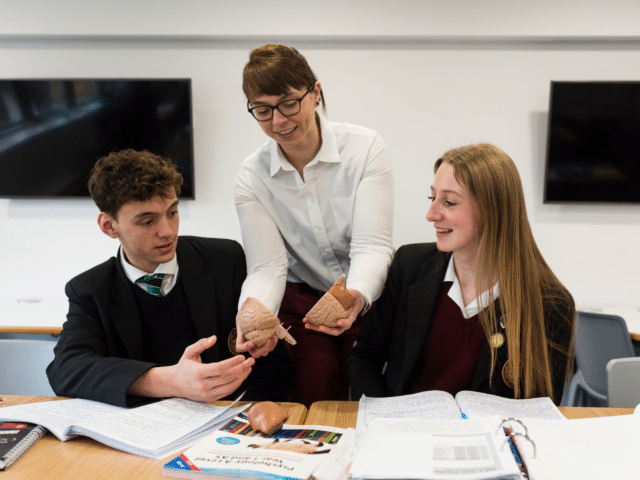As adults, we have the advantage of life experience to know what we should have done when we were studying for our exams, and like our own children, we probably dismissed the advice given to us.
Head of Psychology at Oakham School Charlotte Findlay explores some subtle, but effective, ways to support your child during the exam period.

Tell them you want to learn too
Research has shown that when we are told in advance that we will be expected to teach someone else, we increase the effort exerted into learning the content (Nestojko et al. 2014). This can lead to a retention of up to 12% more information compared to those who were told to prepare for a test.
In this experiment, students were told to read a passage for 10 minutes. They were not allowed to highlight or underline the text but could read and reread at their own pace and were then told to teach others. Test this yourself by giving a timeframe that your child must read their revision materials by and teach you.
This ‘protégé effect’ reinforces understanding and develops metacognitive processing and oracy. The former is the ability to think about our own understanding and learning so that we can plan, monitor, and evaluate our knowledge further.
It transforms thinking from “I don’t know anything” to “I specifically don’t understand the process of X within the larger concept of Y, and this is my plan to overcome that.”
On the other hand, oracy is the ability to coherently express ourselves and our ideas – both of these benefits can develop through a simple conversation. As a result, asking our children to teach us a concept can quickly identify how well they know it and can enable them to plan and evaluate their next steps, so do ask them questions!

Further research has shown that asking students to predict their knowledge in a test or quiz, before taking the test reveals that they often overestimate how much they know (Casselman and Atwood, 2017). Understanding our weaknesses are the first step to addressing them, and like us, our children may continue to review the content they already understand because it’s easier and makes them feel good! Revision is challenging but was always inevitable as forgetting begins as soon as 20 minutes after we have learned information.
Out of sight, out of mind
Statistics show that in 2022, British teens spent 114 minutes on Tiktok and 91 minutes on Snapchat, daily. With instant dopamine hits, social media apps are an easy distraction from revision.
Whilst some teenagers are good at monitoring and regulating their social media usage, some may benefit from an ‘out of sight, out of mind’ approach. This is supported by research that found that simply having a phone in the same room was enough to reduce attention and cause deficits in task-performance (Thornton et al, 2014).
This was tested more rigorously by Mendoza et al. (2018) who asked students to watch a 20-minute lecture followed by a quiz. Students were placed into one of three conditions (full phone use, phone in possession but silent, no phone in possession) and received four texts during the 20 minutes. They found that students performed worse on the quiz when they had their phones and when they scored higher for ‘nomophobia’ (fear of no access to a phone).
Students who were distracted by the texts also performed worse, meaning all three conditions had a negative impact on learning between 10-15 minutes into the lecture.
What does this suggest? 10 minutes is an ideal chunk of revision time before we need a short break, and will support learning ahead of an exam.





